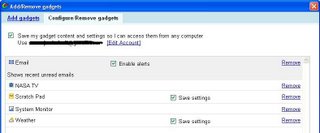Desktop Anywhere
One of the reasons I use a lot of Google's stuff is because it gives me a consistent view of the world, and allows me to pick up right where I left off, regardless of the computer I happen to be using.
If I'm at work, using one of several laptop computers at home, or one of my desktop machines, I can always check email, scan RSS feeds, in the same way and within the same context. I characterize this as the evolution of the ubiquitous computing concept that's been around for many years.
It's sad that the evolution of ubiquitous computing is taking so long. About 10 years ago, the state-of-the-art was actually farther along than it is today. I think of the 1990's as the "golden years" of Unix, when there were multiple vendors of both hardware and UNIX operating systems. We regularly NFS mounted our "home" directory from whatever physical workstation we happened to be using at the time, then used rc scripts to adjust for different desktop needs. The end result was that one could tune one's desktop to look and work the same, regardless of what workstation you happened to be logged in on. Your personal data was always there for you, it was just the box (and sometimes the applications installed on that box) that were different. Why in today's world of virtual desktops we can't realize a similar vision is beyond me. Even the modern Linux user seems content to VNC from one machine into another and plow through the differences in his desktop on each.

Anyway, back to Google.. Looking at the new Google Desktop 5, I see that the evolution continues. Google Desktop has an option (maybe it's been there for a long time, I don't know) to "Save my gadget content and settings so I can access them from any computer." As more of the functionality I expect from my computer migrates to on-line, web accessible, and (for right now) Google based applications, these kind of features should allow me to enjoy the same desktop--regardless of the computer.
In related news, I see that the W3C just started a draft of a Widget Specification This might further the evolution to ubiquitous computing by providing standards for widget implementations--regardless of the platform.
If I'm at work, using one of several laptop computers at home, or one of my desktop machines, I can always check email, scan RSS feeds, in the same way and within the same context. I characterize this as the evolution of the ubiquitous computing concept that's been around for many years.
It's sad that the evolution of ubiquitous computing is taking so long. About 10 years ago, the state-of-the-art was actually farther along than it is today. I think of the 1990's as the "golden years" of Unix, when there were multiple vendors of both hardware and UNIX operating systems. We regularly NFS mounted our "home" directory from whatever physical workstation we happened to be using at the time, then used rc scripts to adjust for different desktop needs. The end result was that one could tune one's desktop to look and work the same, regardless of what workstation you happened to be logged in on. Your personal data was always there for you, it was just the box (and sometimes the applications installed on that box) that were different. Why in today's world of virtual desktops we can't realize a similar vision is beyond me. Even the modern Linux user seems content to VNC from one machine into another and plow through the differences in his desktop on each.

Anyway, back to Google.. Looking at the new Google Desktop 5, I see that the evolution continues. Google Desktop has an option (maybe it's been there for a long time, I don't know) to "Save my gadget content and settings so I can access them from any computer." As more of the functionality I expect from my computer migrates to on-line, web accessible, and (for right now) Google based applications, these kind of features should allow me to enjoy the same desktop--regardless of the computer.
In related news, I see that the W3C just started a draft of a Widget Specification This might further the evolution to ubiquitous computing by providing standards for widget implementations--regardless of the platform.

0 Comments:
Post a Comment
<< Home